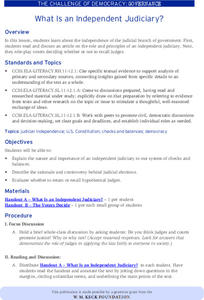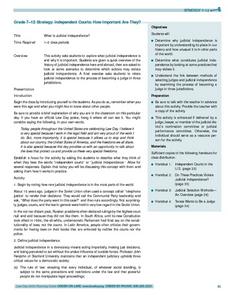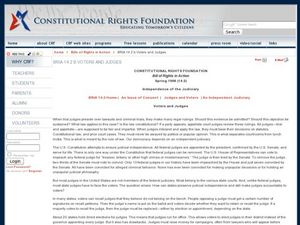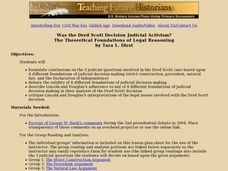Judicial Learning Center
Judicial Independence
Most people support the idea of an independent judiciary in theory until they hear about a court case that violates their principles. An informative resource explains why the concept is important. It also provides scholars of criminology...
Judicial Learning Center
Judicial Independence: What’s Wrong with This Court?
Why is it important for judges to operate independently of politics or other branches of government? Scholars ponder the question as they examine video clips, case studies, excerpts of the US Constitution, and an interactive computer...
Judicial Learning Center
The Power of Judicial Review
Marbury v. Madison is arguably the most important landmark case in the history of the Supreme Court. A fact-filled lesson provides background information about the case and two others related to the concept of judicial review. Scholars...
Constitutional Rights Foundation
What Is an Independent Judiciary?
While justice is supposed to be blind, it doesn't always follow the rules. Using a reading on the independent judiciary and case studies, learners consider what to do with judges who rule in their own self-interest rather than on behalf...
iCivics
Branches of Power
Learners take on the roles of the legislative, judicial, and executive branches of government in the United States and work to develop public policy issues and ideas into laws in this engaging and well-designed online interactive.
Curated OER
Constitution Jeopardy
Although just a quick review of general information learned about the Constitution and U.S. government, this presentation could be used as a fun activity before the beginning of a class lesson, or as an independent experience. The...
Curated OER
The Judicial Branch
In this U.S. branches of government worksheet, students respond to 5 fill in the blank questions regarding the powers of the judicial branch of government.
Curated OER
Branches of Government
After reading a short text on the branches of government in the United States, future voters answer 8 fill-in-the-blank questions, as well as 11 true or false questions. This worksheet would be a great homework assignment or silent...
Curated OER
The Supreme Court: The Judicial Power of the United States
Middle schoolers investigate some basic facts about the Supreme Court by examining the United States Constitution and one of the landmark cases decided by that court. The operation of the Supreme Court forms the focus of the lesson.
Curated OER
What Makes a Good Judge?
Students define qualities that should be considered when selecting judge, evaluate costs and benefits of two methods of selecting and retaining judges, decide whether methods provide for judicial independence
and judicial accountability,...
Curated OER
The Supreme Court: The Judicial Power of the United States
Students learn basic facts about the Supreme Court by examining the United States Constitution and one of the landmark cases decided by that court.
Curated OER
Branches of the Government: Jeopardy Game
Jeopardy games are great ways for students to review concepts in an interesting way. This Game covers the Amendments, 3 Branches of US Government, and miscellaneous terms related to American independence and law.
Heritage Foundation
Courts and Judges
If the Supreme Court is so supreme, why do all cases not just start there? High schoolers learn why every case does not start at the Supreme Court as well as the importance of hierarchy in the US judicial system in the 11th installment...
Curated OER
Independent Courts: How Important Are They?
Young scholars investigate the importance of judicial independence and how it is exercised while conducting research to gather information using different resources. The teacher discusses the importance of Law Day. They also read the...
School Improvement in Maryland
Analysis of Marbury v. Madison
Should the United States Supreme Court have the power of judicial review? Instructors guide class members through a review of Marbury v. Madison and assist class members in writing a brief of the case. As independent practice,...
Curated OER
Voters and Judges
Students analyze the work on independent judiciaries. In this federal courts lesson, students listen to their instructor lecture on details of federal cases. Students respond to discussion questions and participate in an activity...
Curated OER
Baseball Challenge: 5th Grade Social Studies
Quickly review facts relating to U.S. History in a Baseball Challenge presentation. The information relates to branches of government, the Vietnam War, WWII, and other key events.
Odell Education
Reading Closely for Textual Details: "We, as a people, will get to the promised land!"
Take another look—there are probably more details than readers realize. Scholars analyze nine texts in a five-part unit that contains 21 activities to find textual details. Activities include close reading, independent reading,...
Curated OER
America: Influenced by the Enlightenment
In this Enlightenment influence study guide worksheet, learners read 5 quotes from the Declaration of Independence and the U.S. Constitution and then respond to 5 reflection questions.
Curated OER
How the Court Became Supreme
Students investigate how the Supreme Court changed under the leadership of John Marshall. In this Supreme Court lesson, students recognize the role of the Supreme Court as well as the significance of Marbury v. Madison. Students also...
Curated OER
3 Branches of Our Government
This straightforward fill-in-the-blank activity could be used for a variety of purposes. Young historians are given 10 sentences about the branches of government; they fill in the blanks with terminology that is related to the United...
Curated OER
Was the Dred Scott Decision Judicial Activism?
Students debate the validity of 4 different foundations of judicial decision-making. They describe Lincoln and Douglas's adherence to any of 4 different foundations of judicial decision-making in their analysis of the Dred Scott decision
American Constitution Society
Constitution in the Classroom: The Right to Vote
The system of checks and balances is integral to the functionality of the United States government. Learn more about the ways the three branches of the government work together—and about the limitations of their power—with an informative...
Judicial Learning Center
Your 4th Amendment Rights
Americans love to learn about their rights, especially those that protect them from the government's power to invade their privacy. Young people are especially engaged by this topic. An informative lesson explores four Supreme Court...























